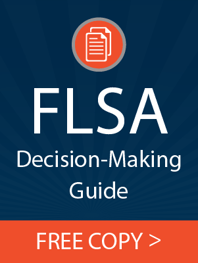Who Will Be Affected by the 2020 FLSA Exemption Change?

On January 1, 2020 the salary threshold for the executive, administrative, and professional exemptions under the federal Fair Labor Standards Act (“FLSA”) will increase from $23,660 ($455 per week) to $35,568 ($684 per week).
What does this mean for California employers?
Although the federal white collar exempt salary increase is expected to affect 1.3 Million workers nationally, there is little affect on California employers. California obligation for Administrative and Executive exemptions is already set at 2x minimum wage ($12 per hour) on a full time basis.
The California exempt salary threshold is $49,920, far above the new federal threshold.
What numbers do I need to know from this Final Rule?

For employers outside of California or that have employees in other states, now is a good time to start acompensation analysis for employees at or near the new threshold. Increases to FLSA force new workforce decisions about how employees are classified and paid in order to mitigate their labor costs while maintaining consistency for the employee.
Identifying both salary and hourly employees who make at or near the new threshold is a start. Analyzing actually worked will help determine if a raise or a reclassification is in the best interest of the company and worker.
FLSA Decision Making GuideDownload our 4 step guide to analyzing and determining the best plan for your employees
under the new FLSA Exemption threshold.
The FLSA salary levels matter as much as the minimum wage for overall trends in labor costs and compensation. Any increase to FLSA tends to have a"lifting effect" overtime across the country.
The Final Federal FLSA Rule by the Numbers:
- $684 per week – salary requirement – up from the currently enforced level of $455/week (level is equivalent to $35,568 per year)
- $107,432 – total HCE compensation threshold – up from the currently enforced level of $100,000 annually
- 10% – amount of the standard salary level the final rule allows employers to cover with non-discretionary bonuses and incentive payments that are paid annually or more frequently
- 1.3 million – estimated number of currently exempt workers who the Department estimates will, without intervening action by their employers, become eligible for overtime
- $298.8 million – estimated amount of extra pay workers will receive each year
- $455/week – special salary level for workers in Puerto Rico, U.S. Virgin Islands, Guam, and the Commonwealth of the Northern Mariana Islands
- $380/week – special salary level for workers in American Samoa
- $1,043/week – “base rate” threshold for employees in the motion picture industry
OnePoint HCM can help with the transition
Many organizations will be faced with an increase in employees who will now be non-exempt and need to track their time. This transition period can be challenging for administrators, managers and employees. To minimize the the impact these changes will have on your business contact OnePoint for a demonstration of our solutions. we offer a unified database with a single login and single user experience. providing employees one login to access all their personal data, self-service and timekeeping is preferable to using multiple disparate platforms.
- Automate time and wage calculations to deliver the perfect pay check
- Track potential wage and hour issues with real-time data and alerts.
- Create best-fit schedules that account for business and compliance needs
- Establish an audit trail with robust reporting
Subscribe to updates
Get the latest posts delivered to your inbox.